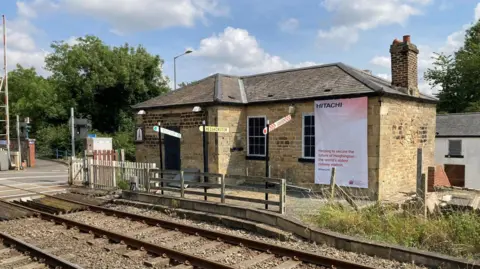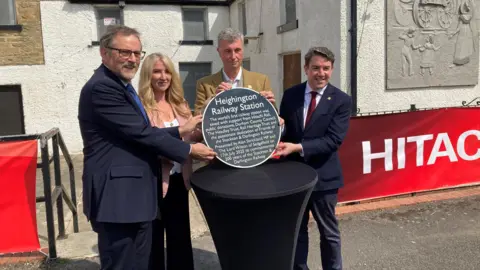'World's oldest' railway station saved
 BBC
BBCCampaigners are celebrating after raising £300k to save what is believed to be the world's first railway station.
Dating back to 1826, Heighington Station, in County Durham, was part of the Stockton and Darlington railway line, which was the first passenger railway to use steam trains in the world.
The building has been shut since 2017 and efforts have been made over the years to revive the dilapidated station.
Friends of the Stockton and Darlington Railway said the "humble" building's future had been secured thanks to a "significant donation" from Hitachi Rail, as well as a crowdfunding effort.
Niall Hammond, chair of friends group, said: "This relatively simple, humble building is the inspiration of all railway stations that came afterwards right across the world.''
The building was ''effectively built as a prototype-railway station before the concept of the railway station had been fully developed", according to Historic England.

In 2024, it was added to Historic England's Heritage at Risk Register but it can now be brought back into use.
Rachel Evans, Hitachi's HR Director for UK and Ireland, said the company ''is immensely proud to help save Heighington, the world's first railway station and give back to the local community".
Alan Strickland MP said: "Our area has long been a centre of rail innovation and I'm so pleased that this piece of history will be saved thanks to Hitachi's generous support."
The friends group had been campaigning to save the Grade II listed site for five years, working with Durham County Council, The Railway Heritage Trust, Headley Trust and Historic England.

It is hoped the station will attract tourists to the area.
A nine-month festival is currently under way, marking 200 years since the opening of the Stockton and Darlington Railway, the first in the world to operate passenger and freight trains.
Regarded as the birth of the modern railway, the 26-mile (42km) journey between Shildon and Stockton via Darlington on 27 September 1825 transformed how the world traded, travelled and communicated.
